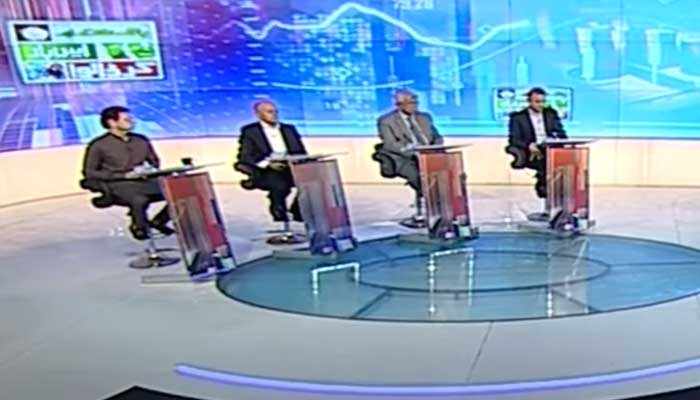Published in The News on February 18, 2025
Experts, at Geo News‘ exclusive Great Debate on the economy, stressed the need for a “cautious and measured approach” to achieve economic growth, calling for structural tax reforms and sustainable policies.
The panel, comprising prominent economists, business tycoons, analysts, and industry leaders, broke down the many-sided challenges and suggested a wide range of strategies to move towards economic growth.
Pakistan, currently bolstered by the International Monetary Fund’s (IMF) $7 billion Extended Fund Facility (EFF) secured in September 2024, is navigating a tricky path to recovery.
The South Asian nation narrowly averted a sovereign debt default, with reserves not sufficient enough to meet a month’s worth of controlled imports in 2023.
Its economy grew by a meagre 0.92% in the first quarter of the fiscal year. Pakistan is looking to generate revenue by speeding up a privatisation push, but efforts to privatise the national flag carrier, Pakistan International Airlines, and outsource the capital’s airport have fallen flat.
In this context, Geo News organised a programme “Aakhri Mauqa” with esteemed experts and government officials from the country participating in the discussion, titled “Pakistan Kay Liye Kar Dalo.”
Prominent participants in the discussion include Arif Habib, chairman of Arif Habib Group, Lucky Cement CEO Muhammad Ali Tabba, Topline Securities CEO Muhammad Sohail and Pakistan Business Council CEO Ehsan Malik.
Speaking during today’s special transmission, Federal Bureau of Revenue (FBR) Chairman Rashid Mahmood Langrial stressed that the government should move towards economic growth “cautiously and gradually”.
“If growth pressure did not calibrate in the right way, it will deteriorate…such understanding is present among the society and decision-makers that we have to move towards growth cautiously,” he said.
Langrial noted that the country cannot afford rapid economic growth despite achieving stability. “The country feels pressure when we maintain stability for two to three years as household incomes get affected,” he added.
He said that the decision-making in the next year, from Feb 2025 to Feb 2026, would be a crucial year for the country as the authorities would decide whether “we have to move with previous trajectory or a new one”.
When asked about difference of opinion in the government in this regard, the FBR chief said there is no difference in moving towards economic growth but pace. “It is easy for the government to set growth target very high but its consequences will affect the society,” he added.
He also rejected the notion of poor people not getting relief despite a significant reduction in inflation, saying “Inflation is an ‘inflation tax’ actually”. “When you have stopped taking tax from the people, you stopped reducing their purchasing power,” he added.
Langrial noted that the country was witnessing early signs of growth in a number of sectors, stressing, “We have to remain steadfast..we have to stay on the course.”
‘Taxation structure’
Meanwhile, Muhammad Ali Tabba — CEO Lucky Cement — backed the FBR chief’s statement of moving “carefully and gradually” towards economic growth, saying that it should be “inclusive and sustainable”.
“If we achieve 6-7% growth based on $6-7 billion imports, it would be detrimental…we, again after six months, have to slow down the economy and devalue our currency to recover it,” he said.
Referring to the inflation, the businessman noted that it was still higher compared to the previous years, stressing the need to evaluate the supply constraints to slow down the prices of necessary items and increase affordability.
“We have to spur indigenous growth…we do not want an import-based growth, nor we can afford it.”
Furthermore, Tabba said, there are sectors in Pakistan, wherein industries exist but on a very small scale, emphasising the need to shift the country’s focus towards such areas such as shipping and aviation industries.
He regretted the “excessive taxation” in establishing a shipping industry in Pakistan, noting that the government cannot attract new industries with high tax rates. “We should focus on developing new areas, which also include data centre, IT industry, which would also increase employment and export service,” he added.
Concurring with Tabba’s views, the FBR chairman admitted that the country’s taxation structure need reforms.
According to Langrial, the corporate tax rate in Pakistan, which is around 39%, was slightly on higher side compared to the neighbouring countries, including India which has around 30%.
Similarly, he said, the country’s import-state taxes, as the ratio of the total taxes, were higher by around 32% in last year’s total revenue. Furthermore, Langrial said, salaried persons at a certain level also face excessive taxation, adding that the government also understands and realises this issue.
“We are in a bind…those who are well-off do not pay taxes,” he said, noting that the country has around Rs1.5 trillion to Rs1.7 trillion tax gap with the top 5% of households not paying taxes on their income.
He also pointed out the lack of capacity development in the FBR for generating tax revenue in “right way and right place”. “If we look into tax-to-GDP ratio from 2008 to 2024, we stand at the same. When we do the adjustment for inflation and growth, our exact nominal tax collection is same,” he said.
Langrial said that efforts were being made to develop capacity and reduce tax weight. “Various measures are being taken to change the behaviour of taxpayers…we are also bringing high-powered incentives and technology in FBR to enhance the authority’s capability.”
Meanwhile, Arif Habib termed the country’s approach “defensive” towards economic growth, emphasising the need to analyse sectors which would not increase the current account deficit.
Citing examples of construction and agriculture sectors, he called upon the government to tap the “under utilised areas”, which according to him contain export potential, benefit the national exchequer and increase tax collection.
He stressed the need to analyse sector-to-sector for economic growth rather than focusing on collective approach.






